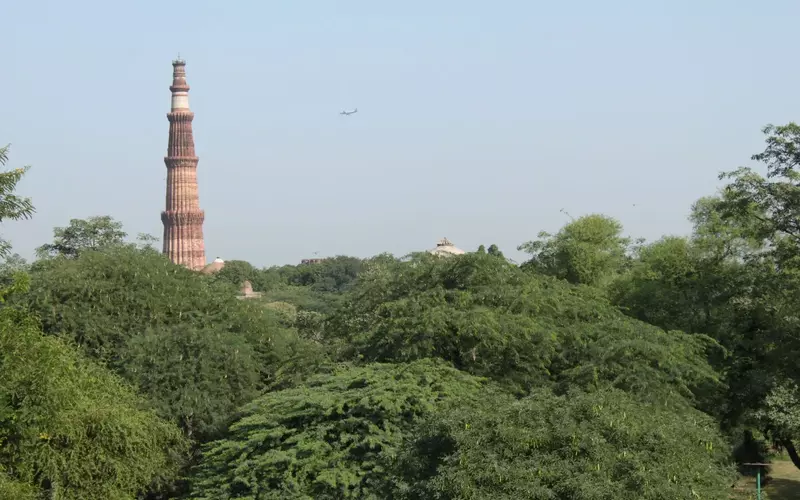

Photo for representation
<p>
At the Conference of Parties in November 2021, Prime Minister Narendra Modi said India pledges to become Net Zero by 2070. A big&nbsp; announcement, it caught many by surprise.</p>
<p>
India made many similar ambitious declarations–achieving 500 GW non-fossil energy capacity by 2030 to reach 50 per cent of its energy requirements from renewable energy sources by 2030 and also launched the global programme – One Sun, One World, One Grid (OSOWOG).</p>
<p>
India is also working on certain big projects like the Namami Gange national mission to clean up the river Ganga as well as the National Solar Mission that seeks to make India a global leader in solar energy.</p>
<p>
<img alt="" src="https://www.indianarrative.com/upload/news/IndiaGate.JPG" style="width: 80%; height: 80%;" /></p>
<p>
<strong><em>The India Gate area presents an oasis of peace to Delhiites (Photo: Rahul Kumar)</em></strong></p>
<p>
Then there are other big-ticket&nbsp; programmes–like the National Clean Air Programme that seeks to combat air pollution by reducing the concentration of coarse particulate matter (PM10) and fine particles (PM2.5) by at least 20 per cent by 2024. Even the keenly-watched and one of the earliest programmes–Swachch Bharat has contributed much to cleaning up India and improving the lives of people substantially and visibly.</p>
<p>
Dr Anjal Prakash, Research Director and adjunct associate professor at the Bharti Institute of Public Policy, Indian School of Business told India Narrative that India has made robust policies on batling climate change. &quot;They are one of the best. We are not lacking in policy direction though we can further improve implementation&quot;.</p>
<p>
Prakash says that India is <a href="https://www.indianarrative.com/science-news/facing-cloudbursts-landslides-and-floods-with-resilient-infrastructure-odisha-show-the-way-105189.html">doing much more than it is supposed to do</a>. &quot;Our renewable energy mission and the solar energy mission are doing well. The Railways has an independent plan to achieve Net Zero. It is doing a lot of experimentation in the field of mass transportation, which is good&quot;.</p>
<p>
He adds that information on many of these programmes needs to be put in the public domain for people to understand these better. &quot;It is important that we have a climate change communications cell that takes positive stories before the people. Our work has to be projected because we are doing a lot&quot;.</p>
<p>
Giving an example, Prakash says that countries in Asia and Africa are looking up to India&#39;s environmental projects and climate change policies. However, they are unable to find India&#39;s work easily. &quot;If someone could showcase our climate change impact through proper documentation, it would help showcase our work globally&quot;.</p>
<p>
With climate change touching different aspects of peoples&#39; lives, right from women and children to how people live and eat, it is leaving behind its mark on human life. &quot;I think we should have a separate cell or ministry which coordinates with other ministries on advising them how to reduce their carbon footprint in each of their programmes, it will have a wider footprint and impact. This cell can also coordinate with and guide various departments at the state level. One day, all of our ministries can become Net Zero – enabling India&#39;s transition towards an environment friendly nation&quot;.</p>
<p>
Prakash says that there is so much happening in the country over climate change that &quot;we need to consolidate data to paint a joint picture of what is happening across the country and across various ministries and departments&quot;.</p>
<p>
<strong>Read More:</strong></p>
<p>
<a href="https://www.indianarrative.com/economy-news/budget-sets-india-on-the-path-of-green-and-tech-driven-growth-for-the-next-years-147224.html">Budget sets India on the path of green and tech driven growth for the next 25 years</a></p>
<p>
<a href="https://www.indianarrative.com/world-news/why-is-the-cop-a-lifeline-for-maldives-and-small-island-nation-states-125374.html">Why is the COP26 a lifeline for Maldives and Small Island Nation States?</a></p>
The QS World University 2026 Rankings bring great news for our education sector, as the…
Speaking at the India Global Forum, Union Minister of Commerce and Industry, Piyush Goyal, says…
Amid the ongoing conflict with Iran, Israel's Foreign Ministry said on Thursday that Soroka Hospital…
India's foreign engagements have entered a new phase of dynamism and purpose, driven by its…
Over the last ten years, India’s global footprint has expanded thereby ensuring India’s voice resonates…
The Indian government has launched Operation Sindhu to evacuate Indian nationals from Iran in view…